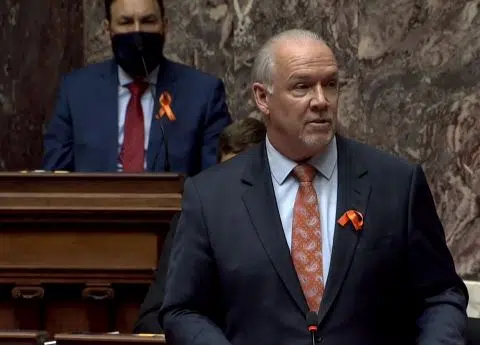
In the B.C. Legislature today, the Premier and several MLAs were emotional as they talked about the far-reaching impact of last week’s revelation from Tk’emlúps te Secwepemc.
John Horgan says it is impossible to imagine what happened at these residential schools, including in Kamloops where the unmarked graves of 215 children were discovered last week.
“It is not just a moment in history as I often revert to to protect the emotions that we all have when we think about our children being torn from us by the state, sent to who knows where to be told to be good, white people,” he said, in a ministerial statement today.
“Its unimaginable to us today, yet a very active part of who we are as Canadians.”
Horgan says he will support Tk’emlúps te Secwépemc as they work to complete their investigation in the weeks ahead. It is anticipated that preliminary findings will be completed by mid-June.
“I want all of us to live with that burden because that’s also the least that we can do,” Horgan added. “Our children were not taken away from us. Our children were not told to be who they were.
“That happened to someone else but our responsibility as legislators is to make sure that the calls to actions – hard fought – are the least that we can do.”
Horgan says all Canadians have a responsibility to acknowledge the dark past of the Residential School System head on.
“Because for survivors of the residential school atrocities, they live it every day. Their children are also living it, and their grandchildren are living it. This is not something that happened in the past. It is something that is going on right now, and the events in Kamloops over the weekend bring that home graphically,” he noted.
“Survivors, most assuredly, feel grief, they feel heartache, and they feel outrage. Children taken from their homes and sent to who knows where, without any notice, and told they could not speak their language, oftentimes beaten, oftentimes sexually abused.”
Also speaking in Victoria was the MLA for Kamloops-North Thompson, Peter Milobar. He says it is hard to put into words exactly what Indigenous people across the country are feeling right now.
“In the past few days, many of us have remarked that there are no words, as the Premier referenced as well, to describe this horrific discovery. But we must find the words,” he said.
“We cannot continue the silence that allowed this to happen in the first place that continues to impact generations of indigenous families in so many ways. We must find the words and we must take action.”
Moving forward, Milobar says it is important to listen to residential school survivors so that they’re able to get closure.
“We must reaffirm our steadfast commitment to meaningful reconciliation and survivors must be heard. We need to work to find them the closure and some peace,” he said.
“We can never forget or ignore the 215 children who lost their lives. Each death is an irreplaceable loss. Each person mattered, and unthinkably thousands more also remain lost.”
A National Indian Residential School Crisis Line has been set up to provide support to former residential school students and people affected. It is available 24-hours-a day at 1-866-925-4419.
Within B.C., the KUU-US Crisis Line Society also offers 24/7 support toll-free at 1-800-588-8717. Alternatively, a youth line can be reached at 250-723-2040 and an adult line is available at 250-723-4050.














